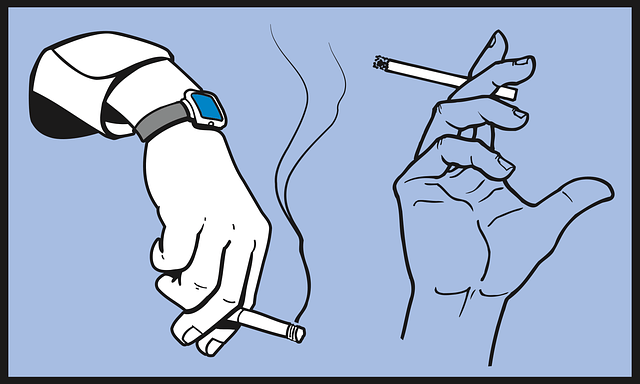Tag: angst
Smoking is a Bourgeois Concept
by The Cowl Editor on September 30, 2021
Portfolio

by Taylor Maguire ’24
Snow wrapped Manhattan in a thick blanket of white. Floating flakes latched onto my brown coat as I walked across the street to Fifth Avenue. The coat belonged to my Aunt Esma whose unique eye color I inherited. Walker, a ghost from my past, once described my eyes as the color of a pond being struck by lightning, although government officials simply recognized them as the color blue on my identification forms. Walker and I met for the first time sophomore year of high school on the day of Thanksgiving in Central Park. A place that collected pieces of my scraped knees and strangers’ cigarette buds. A place where you could hear the echoing music from ice cream machines and the faint cries of irritated and sweaty children coming from every direction.
I don’t remember why, but I was angry the day that we met. I stole my father’s pack of Camel Lights in a moment of retaliation, and left the house before my Aunt Esma arrived with the turkey. Wide-eyed tourists waiting for the parade clogged up crosswalks, and fallen leaves buried the streets in a sea of gold. Believing I had escaped the suffocation of people, I had just begun to light a cigarette when a voice startled me by the park’s Alice in Wonderland Statue, saying,
“Smoking is a bourgeois concept made up by the government in order to control the population, so therefore I cannot support this vice of yours.”
Up until then, Walker was a walking myth to me at school. One that occasionally sported sprinkles of acne along his forehead, and had a poor attendance in anatomy class. The thing about Walker was that he was pigeonholed to his mother’s image, and everyone feared him. He ate alone at lunch, but was smothered at Upper East Side parties by the knockoff Marilyn Monroes of our grade. Walker had brown locks of curls with matching doe eyes. He wore forest green converse and oversized navy blue crewnecks.
“When I smoke I feel like a character from Slyvia Plath’s imagination,” I replied back.
“Didn’t she kill herself?” Walker retorted.
“She stuck her head in an oven,” I replied dryly.
The comforting hands of our high school seemed to weave us together after that encounter. The friendship continued to grow after he sat next to me in Dr. Sabol’s English class. We spent summers together sleeping on twin mattresses at his beach house, arms and legs mangled under goose feather duvets. We peeled sunburned skin off each other’s backs, and swapped secrets as if they were the rarest form of currency.
When the Thanksgiving of our senior year arrived, Walker had bought us a pack of cigarettes at a nearby bodega and took me to the Great Lawn.
“You never smoke,” I said to him that day.
“No, but this is a special day because this is the day where we discover which college will be taking you away from me.” He said it quite seriously. The only thing I could do was let him light the cigarette that dangled from my lips.
“I’m not going anywhere. We’ll stay friends while we’re at school. Did you decide where you wanted to go to college?” I replied.
“Oh please, don’t act coy. My mother’s life plan for me is very limited. Starts with me attending one of the Ivy Leagues and ends with me living amongst the people who worship their mundane jobs, their towheaded children, and their Toyotas with extra gas mileage,” he said spitefully.
“You don’t have to do any of that, you know,” I reminded him. He lit his own cigarette and looked back at me.
“It’s easier said than done. Your accomplishments stem from your very own elbow grease. Mine are mirrored by my family’s name. I’m merely a shadow of their achievements.” Neither of us spoke more about the subject that day. Walker slipped in and out of my life much like a feral cat who invades every home it charms its way into. We wrote letters to each other for a while, but soon I stopped seeing my name written in his handwriting on baby blue envelopes. I forgot about him completely until I saw his mother’s name in the newspaper last week under the obituary section. His photograph was projected right beside it, where he stood beside his towheaded children who he mentioned with such contempt years before. He has wrinkles now, his bright doe eyes have become jaded, and his mounds of brown curls include waves of gray.
I light a Camel Light now, walking by the Alice in Wonderland statue while Lewis Carroll’s characters continue to be buried under spools of snow. The park suddenly falls into a deep silence as the landmarks of my childhood freeze over.
